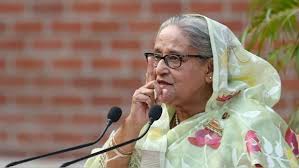DHAKA: The interim government of Bangladesh has sought the extradition of deposed Prime Minister Sheikh Hasina from India, a move that will require New Delhi to walk a “diplomatic tightrope”.
Dhaka has made a formal request to New Delhi citing the 2013 extradition treaty between the two countries to seek custody of Hasina, who is accused of multiple crimes in her country.
A spokesperson for the Ministry of External Affairs said, “We received a note verbale from the Bangladesh high commission today in connection with an extradition request.”
“At this time, we have no comment to offer on the matter,” the spokesperson said.
A note verbale is a formal diplomatic communication between two countries. It is less formal than a letter.
In Dhaka, foreign adviser in the interim government Touhid Hossain said Bangladesh had sought Hasina’s extradition citing a treaty of December 2013. “We sent a note verbale to the Indian Government saying that Bangladesh wants her (Hasina) back for the judicial process,” Hossain said.
Bangladesh home affairs adviser Lt Gen Jahangir Alam Chowdhury (retd) said at a press conference in Dhaka, “We have a prisoner exchange agreement with India. The extradition will be carried out under that agreement.”
India could use multiple sections in the extradition treaty to turn down the request from its neighbour. Section 6 of the treaty says “extradition may be refused if the offence for which it is requested is of a political character”. It excludes charges of murder, terror-related crime and kidnapping.
Another basis for the refusal could be Article 8 of the treaty, which includes situations in which the accusation is not made in good faith in the interests of justice, or if the offence is a military nature not recognised under general criminal law.
Sources said India could potentially refuse extradition on the basis that the charges against Hasina were not made in good faith.
The extradition treaty between India and Bangladesh, initially signed in 2013 and amended in 2016, was aimed at addressing the issue of insurgency and terrorism along the shared borders of the two nations.
The interim government in Bangladesh has said it plans to investigate Hasina in connection with allegations that she ordered killings and enforced disappearances of dissidents during the public uprising against her regime in July and August. A total of 51 cases have been filed against her, including 42 for murder.
A commission formed by the Muhammad Yunus-led interim government had alleged on Saturday that India was involved in cases of enforced disappearances by the security forces during Hasina’s 16-year rule.
Hasina is in India since August when she flew out of Dhaka on board a military plane that landed at the Hindon airbase, 20 km east of the national capital. Yunus took over as the head of the interim government in Bangladesh on August 8.
The diplomatic ties between New Delhi and Dhaka have been strained since Hasina fled to India. After that, incidents of violence against religious minorities were reported from several parts of Bangladesh. India said last week that 2,200 cases of violence against Hindus and minorities were recorded in Bangladesh this year.


